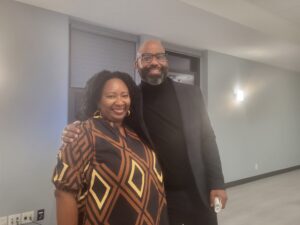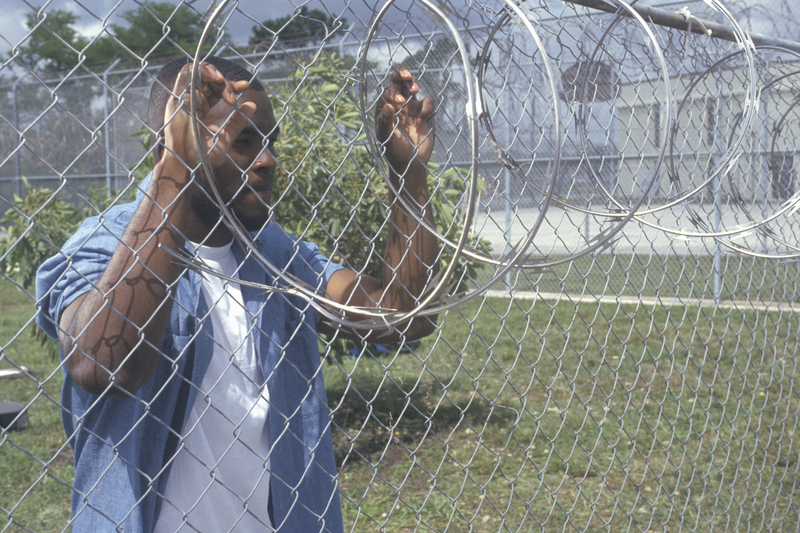By Kay Bolden
A leading sociologist presented a compelling keynote message during a three-day conference at Lewis University.
MacArthur “Genius Grant” Fellow and University of Chicago sociologist Dr. Reuben Jonathan Miller began a keynote address at Lewis University with an alarming statistic.
“Today,” he said, “19.6 million people live with a felony record. One-third of them are Black.” Almost all lived in dire poverty before their prison experience and will return to those same conditions upon their release.”
Speaking to faculty, students and community members at the October 21-22 conference, Confines of Places: The Intersections of Race, Place, Migration, and Mass Incarceration, Miller posed the ultimate ethical question: What kind of society do we want?
In his acclaimed book, Halfway Home: Race, Punishment and the Afterlife of Mass Incarceration, Miller recounts the lifelong burden that even a single arrest can entail in the life of Black families. “The prison lives on through the people who’ve been convicted, long after they complete their sentences, and it lives on through the grandmothers, loved ones, and children forced to share the burdens because they are never really allowed to pay their so-called debt to society.”
In Illinois alone, over 1,400 laws regulate the lives of convicted felons, even after they’ve finished probation, or when their actual incarceration was decades in the past. These laws impact future employment, rental applications, parental rights, whether they can qualify for food stamps, or if they can get student loans to complete their education and improve their economic prospects. In some states, a conviction can even prevent them from voting.
The October 21-22 convening at Lewis was part of the university’s participation in Legacies of American Slavery: Reckoning with the Past, which is an initiative of the Gilder Lehrman Center for the Study of Slavery, Resistance, and Abolition at Yale University, in collaboration with the Council of Independent Colleges.

Led by Professor and Chair of Sociology Tennille Allen, Ph.D, Lewis University is one of seven institutions nationwide selected to serve as a Regional Collaboration Partner. In addition to Dr. Miller, the event also showcased Jose Cruz, who spent 28 years in prison wrongfully convicted; community activist Antony Alban, who created a music program at Cook County Jail; poets Tara Betts and Zakiya Cowan; and Ruby Mendenhall, Ph.D, a professor of sociology at Carle Illinois College of Medicine whose research focuses on how living in racially segregated neighborhoods with high levels of violence affects Black mothers’ mental and physical health.
“Black women have always created possibilities–for our families, for our communities, for ourselves,” Allen said.
Allen also directs Lewis’ African American Studies, and Ethnic and Cultural Studies Programs. She is the author of numerous works on African American relationships, social networks, food inequalities, Black feminist scholarship, and African American cultural and creative practices.
Allen noted that, “African Americans in the region around Lewis are overrepresented in arrests and the prison population. The disruption to families and our sense of community this causes, bears a strong resemblance to disruptions caused during enslavement. This illuminates a clear path between the legacies of slavery, the Great Migration, and the residential segregation those moving from towns across Alabama, Mississippi, and Tennessee faced, and the mass incarceration their descendants currently face.”
In his keynote, Miller illustrated how insidious the legacies of slavery can be: the over policing of Black communities, the racial disparities in sentencing between Black and white defendants for identical crimes, and the presumption of guilt when police encounter Black youth.
“Black guilt–and by association, white innocence–has become the engine of the American justice system,” Miller said.
In one harrowing example, he shared clips of a white police officer holding four unarmed and terrified Black children at gunpoint while their parents begged to be allowed to approach. In the aftermath, which fortunately was resolved without gunfire, the officer tells the boys’ parents that they were just “in the wrong place at the wrong time.”
“There is no “right place” for Black children,” Miller commented. Those boys and their parents will carry that trauma the rest of their lives. Today, one in nine Black children has or had an incarcerated parent.
Miller was awarded a 2022 MacArthur Fellowship by the John D. and Catherine T. MacArthur Foundation. The prestigious fellowship recognizes individuals from across disciplines who show exceptional creativity in their work.
Legacies of American Slavery is a multi-year project, providing a variety of opportunities for colleges, faculty, students, and community-based partners to participate in research, teaching, and learning, and engage in public discussions about the legacies of American slavery. The project is supported by a generous grant from the Mellon Foundation, with supplemental funding from the National Endowment for the Humanities.
Lewis University will continue this important work with several initiatives, Allen said. Faculty in Sociology, for example, are conducting oral history/interview-based research centered in Joliet and Fairmont, with a focus on the experience of migration, as well as re-entry and rights for people who had been incarcerated. Faculty in Justice, Law, and Public Safety Studies are finalizing a collaboration to work with men incarcerated at Statesville prison on a documentary and an oral history project relating to mass incarceration. Others are facilitating community arts programs relating to the race, place, and migration theme.
“In seeking safety,” Miller concluded, “we have produced a more dangerous world. It’s time to focus on human thriving, rather than risk reduction.”




